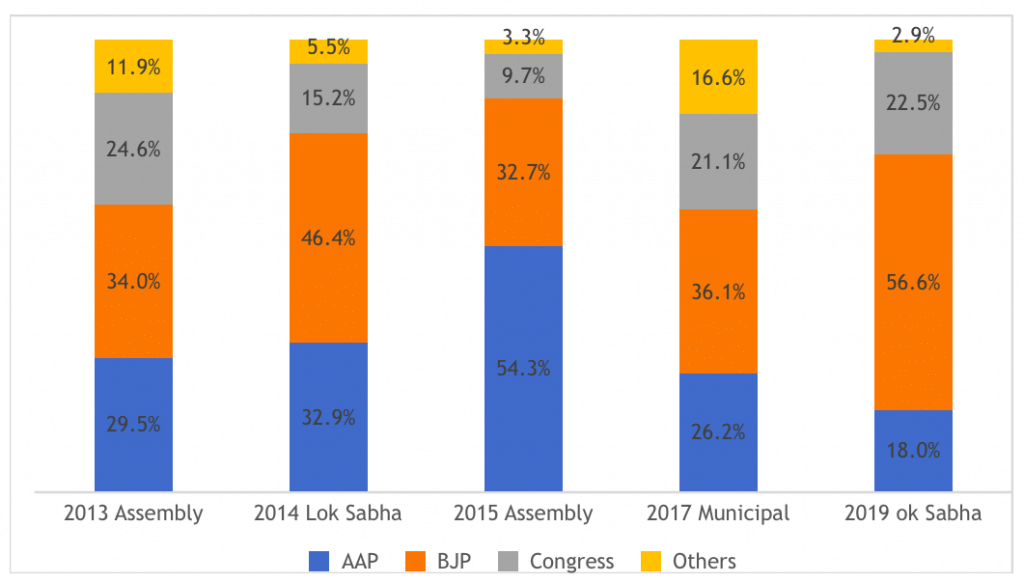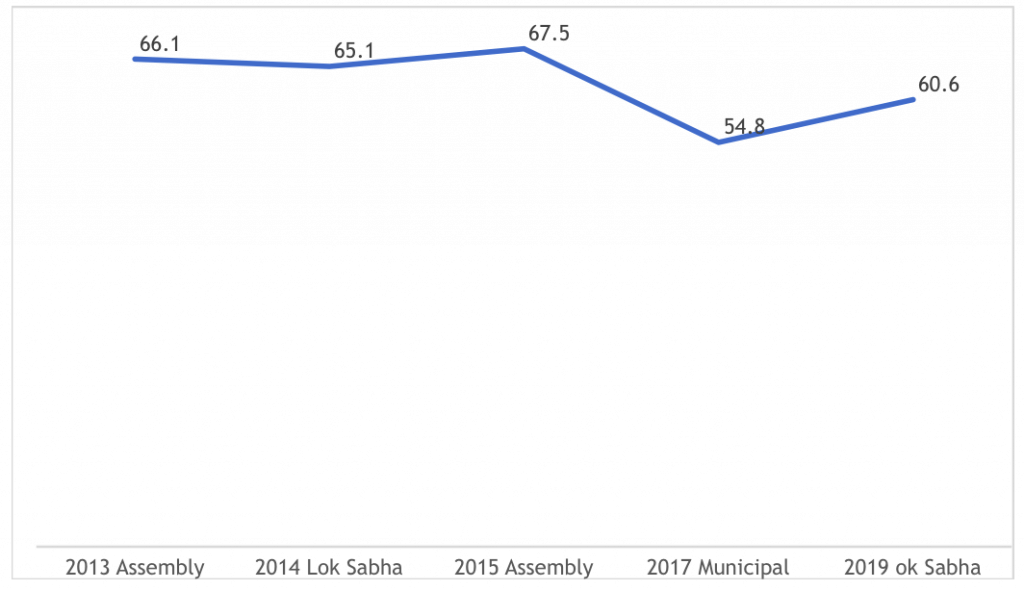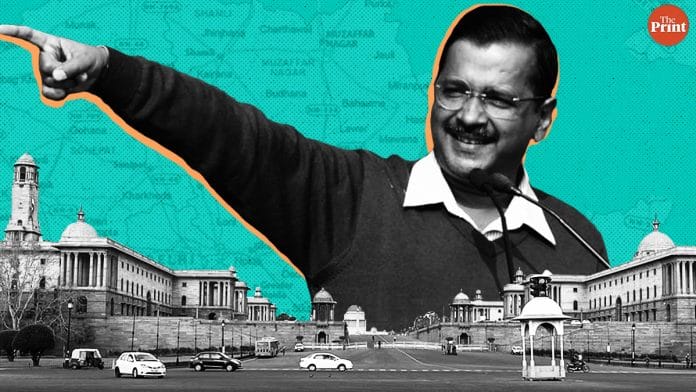Will the Aam Aadmi Party repeat its 2015 feat in Delhi? Or has the hyper-pitched campaign of the Bharatiya Janata Party succeeded in closing the perceived gap in the last two weeks?
The results on 11 February essentially hinges on these two questions.
Delhi’s electoral history
The electoral history of Delhi in the past decade as represented in Figure 1 and Figure 2 points to some interesting revelations. First, the BJP seems to have a core base in Delhi, which is approximately 32 per cent of voters. The party makes massive gains during Lok Sabha elections – 46 per cent in 2014 and 56 per cent in 2019 – but slides back to its core base during assembly elections. Second, the Congress collapses during assembly elections. And, the share of independents and other parties have now become abysmally low. Third, the AAP’s gain in 2015 was largely a result of the shrinking space of the non-BJP parties in the state along with a quarter of BJP voters in Lok Sabha 2014 supporting the AAP. Fourth, the voter turnout in 2019 declined by six percentage points. While the demographic and partisan affiliation of those who did not turn up in 2019 elections is difficult to pin-point, it is possible to infer who these electorates may vote for if they do turn up. Given the massive increase in BJP’s vote share in 2019 and decline in AAP’s, these electorates are more likely to vote the non-BJP parties and from a demographic section that is less likely to support the BJP (Muslims, lower caste Hindus, migrants and the poor).
How will this electoral arithmetic play out this weekend when Delhi goes to polls? The Lokniti-CSDS surveys show that even during the 2019 Lok Sabha elections, a large number of BJP supporters (also Congress, which came second in terms of vote share) indicated a preference for Arvind Kejriwal as the chief minister and the possibility of voting for the AAP in the assembly elections.
Figure 1: Fluctuating Vote Share of Political Parties in Delhi (in %)

What is the profile of voters who may switch from BJP to AAP?
We analysed the 2015 post-poll survey to ascertain the profile of voters who stayed with the BJP in both elections (as core BJP) and those who shifted to other parties (primarily AAP) between 2014 and 2015. The post-poll surveys often ask the voting intention in the current election as well as the previous election. The 2014 BJP voters who shifted to the AAP were more likely to be poor, living in under-developed colonies, less educated and exposed to media sources, and lower caste.
Also read: Delhi’s cab, auto drivers are upset with Kejriwal, AAP. But here’s how they plan to vote
Why are these voters switching party preferences?
A similar shift in vote choice was visible during the Haryana and the Jharkhand assembly elections last year.
The BJP faced negative vote swings upwards of 20 percentage points just a few months after massive Lok Sabha victory in these states. Is it that these electorates vote for the BJP in the national elections with the objective of electing Modi as the Prime Minister (to reward his government for welfare benefits or care more about India’s national security during Lok Sabha elections) and return to their old partisan loyalties in state elections? Or are these voters making sophisticated choices by splitting their votes to maximise their benefit matrix? Cross-section surveys are not well equipped to answer the underlying processes behind this phenomenon, and we must wait for deep ethnographic accounts to reach any conclusion.
Figure 2: Declining Voter Turnout in Delhi (in %)

Also read: How Modi, Shah & Yogi couldn’t stop talking about Shaheen Bagh in Delhi election rallies
Changing the narrative
The mainstream narrative of the Delhi election seems to have changed drastically. The AAP looked in complete control a few weeks ago to pull a 2015-like victory. Arvind Kejriwal and his team were largely talking about the changes they have brought in government schools, mohalla clinics, subsidised water and electricity bills, efforts to decongest Delhi traffic, among other things. They stayed clear of making any attack on PM Modi and opposing the Modi government’s moves on BJP’s ideological platforms such as scrapping of Article 370, Ram Mandir judgment, and the CAA-NRC.
After two weeks of high-pitched campaign from the BJP’s top brass, including provocative remarks by several party leaders, many seem to be of the opinion that the BJP’s graph is rising in Delhi. Modi described the protests at Shaheen Bagh and other such places as a political experiment aimed to defame his government.
Why has the BJP suddenly gone all out to make this election look competitive? Perhaps, the party not only wanted to avoid a whitewash, but also build on the momentum it has created due by delivering on long-standing ideological agendas. Notwithstanding the result, each election campaign provides the BJP leadership with an opportunity to push the ideological framework governing party politics in India. This enthuses the party’s core support base to turn out and gives the BJP a chance to attract new voters to its fold. Moreover, our interactions with BJP booth-level workers in Delhi suggest that their party under Modi and Shah is unlikely to give opposition parties an easy victory. They are putting their heart and soul in the campaign so that the opposition has to sweat hard for every vote.
On multiple occasions in the past, Prime Minister Modi’s campaign has propelled the BJP to convincing victories, snatched a victory from the jaws of defeat, and changed near-certain whitewashes to respectable defeats. Given the electoral arithmetic of Delhi 2020, an outright victory for the BJP seems out of bound. The BJP hopefuls must be banking on Prime Minister Modi’s magic to turn this at least into a respectable defeat.
Rahul Verma is a fellow at the Centre for Policy Research. Pranav Gupta is pursuing a PhD in political science from the University of California, Berkeley. Views are personal.







Delhi ke logon ko muftkhori pasand hai aur mujhe bhi. Arvind hai toh mumkin hai.
Also add all modi haters be damned as they have nothing other than hate to offer.
The BJP is interested only in winning elections no matter what the cost. That is the only thing it cares about. To this end, they will lie, cheat, Stoke communal passion, exaggerate, boast, maybe even start a war. The economy be damned. The quality of life be damned. There will be no talk of education, healthcare, maintenance of law and order, human rights , all round progress.
The Congress with the Gandhi family on top is no match for it. Nobody wants to work in the opposition at the grass roots. So this nightmare will continue for a long time without an end in sight.
Fully agree
Couldn’t agree more!